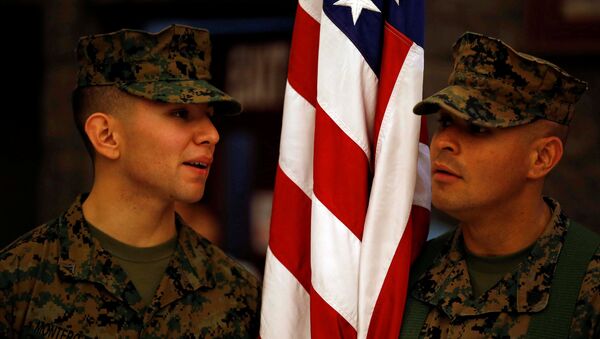Traditionally, the joint military training was designed to test and exercise the interoperability of the US and Philippine forces in areas such as amphibious landing attacks and irregular warfare. However this year the exercises have been rejigged to focus on fields such as counterterrorism and humanitarian assistance. The demonstrations of joint US-Philippine firepower that could be seen at previous Balikatan exercises were missing.
Opening Ceremony for #Balikatan 2017 has begun. #shouldertoshoulder
— ExerciseBalikatan (@BalikatanEx) May 8, 2017
This could be an early symptom of President Duterte's stated intention to rebalance Philippine foreign policy priorities away from its traditional ally, the United States, and toward the emerging regional powerhouse, China.
Duterte's position toward joint military exercises and drills is a marked shift from that of his predecessor, Benigno Aquino III, who doubled the size of joint war games in 2015 and increased the number of Philippine troops taking part in them. The Obama administration's Defense Secretary Ash Carter was also the first in that position to oversee the Balikatan war games exercises in 2016.
At the Balikatan opening ceremony, both US and Philippine officials were quick to stress that while the exercises had been scaled down, they remain very valuable to both sides. Lt. Gen Lawrence Nicholson, the director from the US side, said that training in counterterrorism and humanitarian assistance was "beneficial" and "critically important." Defense officials on the Philippine side conceded that the drills had been scaled down at the request of Duterte's government, but still placed importance upon them.
PH, U.S. Soldiers share jungle survival skills and tactics during #Balikatan#FriendsPartnersAllieshttps://t.co/4bSIh5aNmv pic.twitter.com/SEdreYfpBG
— ExerciseBalikatan (@BalikatanEx) May 15, 2017
Philippine Brig. Gen. Restituto Padilla said that guidance was received from Mr. Duterte to focus less on major maritime drills and more on humanitarian assistance and disaster response. "What we do as a military is always with the guidance from our political leaders," he said. He emphasized that disasters are just as much of a threat as war and that militaries should learn to deal with.
While the US has tried to strike a cordial tone, with US Marine Gen. John Jansen saying that there were "no orders" to "downsize" the exercises this year, there are genuine causes of concern for the US military over the intentions of President Duterte.
The Philippine leader has been making efforts to cultivate closer ties with China and has said that the two countries should hold joint military drills. Mr. Padilla has also said that Chinese participation in the humanitarian and disaster relief exercises would be welcome as it is a "universal concern" with a "multilateral atmosphere."
US-Philippine joint drill #Balikatan scaled down, focused on disaster response https://t.co/h58UvneF8D pic.twitter.com/uDx63BEsqM
— Global Times (@globaltimesnews) May 7, 2017
It should however be remembered that the Philippines is one of the most disaster-prone countries in the world, and would need all of the international help it could get if a disaster were to strike. It is likely because of this that at this years Balikatan opening ceremony, the exercise co-director Lieutenant General Oscar Lactao mentioned Typhoon Haiyan, which hit the country back in November 2013 and killed approximately 6,000 people. The Philippines is also a recruiting sergeant for Islamist terrorism linked to the separatist Moro minority in the South of the country. Unless and until China commits itself to helping the Philippines combat these issues, then the US remains a necessary partner.
While President Duterte may have expressed his will to alter the Philippine foreign policy trajectory, its worth remembering that he is only in his first year of his six-year term, and Manila still has ongoing disputes with Beijing over island in the South China Sea. Thus it is very likely that the Philippine leadership will want to keep such joint exercises close to its chest of the time being.




